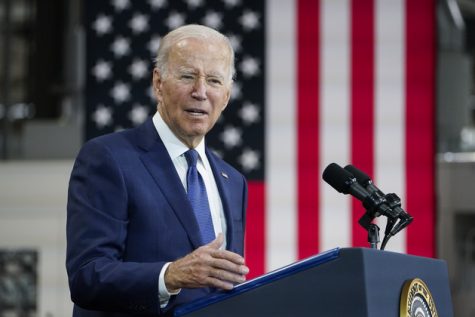Biden administration relieves student loan debt
November 1, 2022

This August, President Joe Biden fulfilled one of his biggest campaign promises: to deliver financial relief to millions of Americans. While not a partisan topic, Biden and the Democrats finally passed the bill, which reduces student loan debt by $10,000 to students not receiving Pell Grants, and $20,000 for those with Pell Grants. However, this forgiveness does not apply to all—only to families earning less than $125,000 per year. These details will allow for nearly 45% of student loan borrowers, over 20 million, to have their debt fully canceled. Although some argue it is not enough, Biden’s administration has definitely taken a good first step into solving the student debt problem.
The impacts of the bill are yet to be seen, as the policy does not come into effect until Jan 2023. There is no doubt that the ripple effects of the bill will create a dividing line between Americans. For college students, this will be very relieving, as many will see a reduced amount of college loan debt once they graduate college. Many post graduate Americans have suffered severely from student loan debt, as it is a burden on their shoulders as they try to enter the workforce. This slows their start to adulthood, as much of their first job’s income must be set aside to pay off college debts. This will force more people to be unable to afford houses they covet more, and force them to settle for lower market houses. The hope of the policy is that the $10,000 reduction in student debt will help aid those postgraduate students in pursuing their ambitions more after college.
With that being said, the effects of the policy are not without its possible negatives. Many people have speculated that much of this reduced student loans will eventually be offset by taxes. This will make some American taxpayers unhappy, because the majority of Americans would not like to pay more taxes if they do not have to. According to a poll by the Cato Institute, 64% of Americans oppose the bill if it will raise their taxes. Another factor that contributes to the opinion of the public over the policy is whether or not by lowering student loan forgiveness, will colleges subsequently raise the price of admission? According to the Cato Institute, 76% of Americans would oppose the Biden administration’s bill if it drove up the price of college. If colleges were forced to raise the price of admission, I think that both moves would cancel each other out, so the benefits of the bill would then be nullified.
Subsequently, if colleges do not have to raise the price of admission, the possible benefits of these student loan forgiveness would far outweigh the negative effects of the bill. Reducing student loans will greatly benefit postgraduate students in starting new careers and being able to move up the ranks in the workforce more quickly. This will also allow for four-year universities to be more appealing and attainable for lower class citizens because of the reduced debt that families will have to incur. Furthermore it could increase the percentage of high school students that attend college.
Overall, student loan forgiveness is a good thing, and its benefits far outweigh the negatives. With the bill not going into effect until January, 2023, it remains to be seen what effect the policy will truly have on students and their families. Therefore, when the bill does go into effect, it will be very clear early on how effective the bill is going to be.


